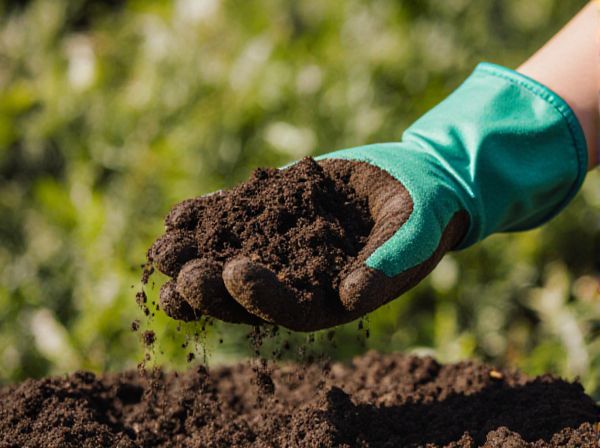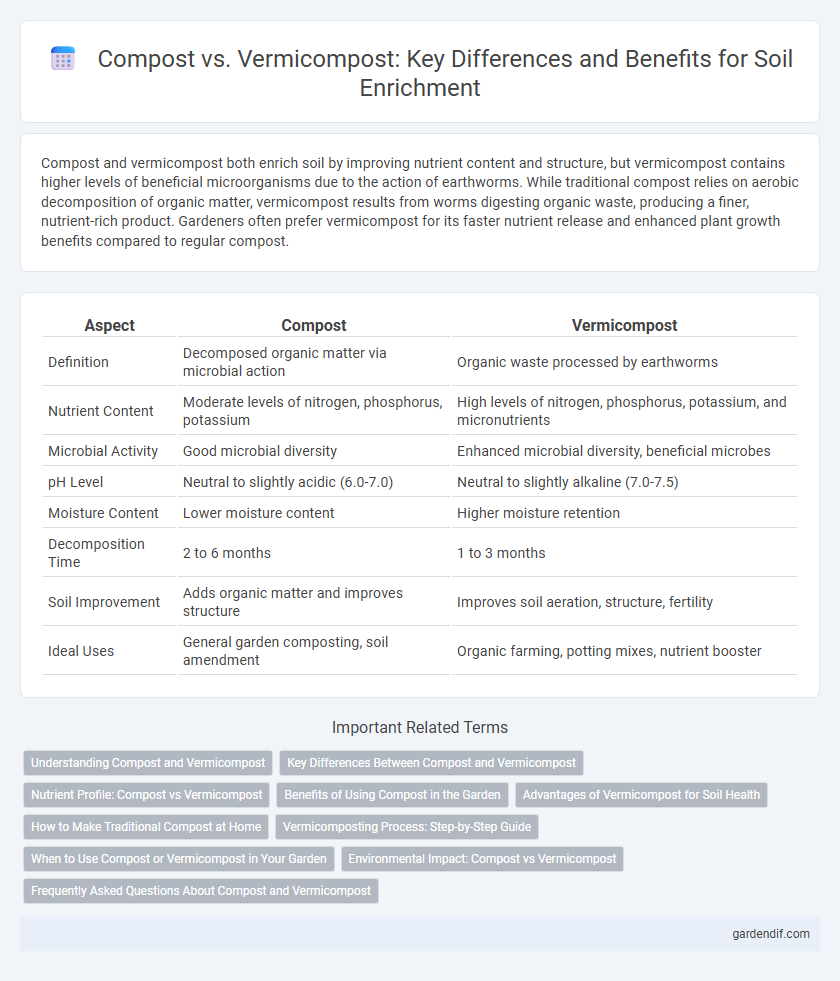
Compost vs Vermicompost Illustration
Compost and vermicompost both enrich soil by improving nutrient content and structure, but vermicompost contains higher levels of beneficial microorganisms due to the action of earthworms. While traditional compost relies on aerobic decomposition of organic matter, vermicompost results from worms digesting organic waste, producing a finer, nutrient-rich product. Gardeners often prefer vermicompost for its faster nutrient release and enhanced plant growth benefits compared to regular compost.
Table of Comparison
| Aspect | Compost | Vermicompost |
|---|---|---|
| Definition | Decomposed organic matter via microbial action | Organic waste processed by earthworms |
| Nutrient Content | Moderate levels of nitrogen, phosphorus, potassium | High levels of nitrogen, phosphorus, potassium, and micronutrients |
| Microbial Activity | Good microbial diversity | Enhanced microbial diversity, beneficial microbes |
| pH Level | Neutral to slightly acidic (6.0-7.0) | Neutral to slightly alkaline (7.0-7.5) |
| Moisture Content | Lower moisture content | Higher moisture retention |
| Decomposition Time | 2 to 6 months | 1 to 3 months |
| Soil Improvement | Adds organic matter and improves structure | Improves soil aeration, structure, fertility |
| Ideal Uses | General garden composting, soil amendment | Organic farming, potting mixes, nutrient booster |
Understanding Compost and Vermicompost
Compost is decomposed organic material created through aerobic microbial activity, enriching soil with nutrients and improving moisture retention. Vermicompost results from the breakdown of organic waste by earthworms, enhancing nutrient availability and microbial diversity beyond traditional compost. Both enrich soil health but vermicompost offers higher levels of nitrogen, phosphorus, and potassium, vital for robust plant growth.
Key Differences Between Compost and Vermicompost
Compost is decomposed organic material primarily broken down by microorganisms, producing a nutrient-rich amendment with a coarse texture, while vermicompost results from the digestion of organic waste by specific earthworm species, offering a finer, humus-like product rich in beneficial microbes and plant growth hormones. Vermicompost generally contains higher levels of nitrogen, phosphorus, and potassium compared to traditional compost, enhancing soil fertility more effectively. The aeration and moisture levels during vermicomposting are critical for worm activity, whereas traditional composting relies on microbial processes activated by heat and turning.
Nutrient Profile: Compost vs Vermicompost
Compost contains a balanced nutrient profile with moderate levels of nitrogen, phosphorus, and potassium, supporting overall soil health and plant growth. Vermicompost, enriched through the digestion process by earthworms, offers higher concentrations of essential nutrients, beneficial microbes, and plant growth hormones. This enhanced nutrient density in vermicompost accelerates nutrient absorption, improving soil fertility and crop yields more effectively than conventional compost.
Benefits of Using Compost in the Garden
Compost improves soil structure, enhances moisture retention, and increases nutrient availability, promoting healthy plant growth. It supplies essential organic matter that supports beneficial microorganisms, boosting soil fertility and ecosystem balance. Using compost reduces the need for chemical fertilizers, lowers soil erosion, and fosters sustainable gardening practices.
Advantages of Vermicompost for Soil Health
Vermicompost enhances soil health by increasing nutrient availability, improving soil structure, and promoting beneficial microbial activity more effectively than traditional compost. It contains higher levels of essential nutrients such as nitrogen, phosphorus, and potassium, which are readily accessible to plants, boosting growth and yield. The presence of earthworm-derived enzymes in vermicompost accelerates organic matter decomposition, leading to improved soil aeration and water retention.
How to Make Traditional Compost at Home
Creating traditional compost at home involves layering organic kitchen scraps, yard waste, and other biodegradable materials in a designated compost bin or pile, ensuring a balanced mix of carbon-rich "browns" and nitrogen-rich "greens." Maintain moisture by watering the pile occasionally and aerate it by turning the materials every few weeks to promote aerobic decomposition. Over a period of 3 to 6 months, microbial activity breaks down the organic matter into nutrient-rich humus, ideal for enriching garden soil.
Vermicomposting Process: Step-by-Step Guide
Vermicomposting involves layering organic waste materials such as kitchen scraps and shredded paper with red wiggler worms (Eisenia fetida) in a well-aerated bin or pit. The worms consume the waste, breaking it down through digestion and producing nutrient-rich castings, which serve as high-quality organic fertilizer. Maintaining optimal conditions--such as moisture levels around 70%, temperature between 15-25degC, and regular aeration--ensures efficient breakdown and minimizes odors during the vermicomposting process.
When to Use Compost or Vermicompost in Your Garden
Compost provides a nutrient-rich soil amendment ideal for improving soil structure and moisture retention in larger garden beds and during planting seasons. Vermicompost, rich in beneficial microbes and enzymes, is best used as a nutrient booster for potted plants, seedlings, or when plants require a gentle nutrient supply. Both enhance soil fertility, but vermicompost accelerates plant growth and resistance to pests more effectively, making timing crucial based on garden needs.
Environmental Impact: Compost vs Vermicompost
Compost and vermicompost both improve soil health by recycling organic waste, but vermicompost offers superior environmental benefits through faster decomposition and higher nutrient retention driven by earthworm activity. Vermicomposting generates less greenhouse gas emissions compared to traditional composting methods, reducing the carbon footprint associated with organic waste management. The enriched microbial diversity in vermicompost also enhances soil fertility and structure more effectively, promoting sustainable agriculture and reducing the need for synthetic fertilizers.
Frequently Asked Questions About Compost and Vermicompost
Compost and vermicompost differ primarily in their decomposition processes; compost involves microbial breakdown of organic matter, while vermicompost utilizes earthworms to accelerate nutrient-rich humus formation. Key FAQs often address the nutrient content, with vermicompost typically having higher levels of nitrogen, phosphorus, and potassium, enhancing soil fertility more effectively than traditional compost. Questions about application reveal vermicompost's superior benefits for soil aeration, moisture retention, and promoting beneficial microbial activity, making it ideal for organic gardening and sustainable agriculture.
Compost vs Vermicompost Infographic

 gardendif.com
gardendif.com